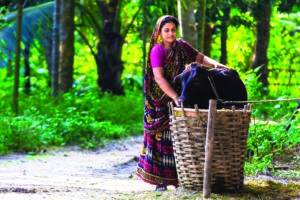Women livestock farmers in Bangladesh are thriving. Our training and connections with local authorities and the private sector has helped them build profitable and sustainable businesses.
The livestock sector is growing steadily in Bangladesh, creating income opportunities for new and existing farmers. However, basic information about things like animal care and animal feed is scarce. Many farmers depend on the help of government-employed livestock officers, but their capacity is limited and they’re often unable to offer bespoke, timely advice.
Getting started as a livestock farmer is expensive, which puts it out of reach for many people, especially women. For them, getting financial support can be particularly difficult, because women in Bangladesh are not expected to be financially independent. Even if a woman farmer is able to get a loan, simple tasks like finding quality feed and keeping animals healthy are difficult without the right skills and connections. Many of them struggle to make a profit.

Chandni was finding it difficult to make ends meet as a livestock farmer. Unable to get a loan and without business skills, every day was a struggle. With our help, she was able to get financial support, training and practical advice.
A holistic solution
In 2017, our consultants in Bangladesh started working with a local micro-finance institute to establish the Livestock Business Centre in Faridpur to support women farmers.
The centre helps women get loans so they can get their businesses off the ground. We also share knowledge about cattle rearing techniques and disease prevention, as well as giving business advice.
We work with the government-employed livestock officers to help them get their important messages to farmers more quickly and accurately. Meanwhile, our partnership with a leading livestock feed company means farmers can buy high-quality feed at a good price.
With this package of financial help, new practical skills, business know-how and access to quality feed, farmers are able to grow a profitable business.
Growth and adaptation
Three years after the business centre was founded, it has 638 women livestock farmers signed up as members. They pay a small fee for membership, which helps to make the project self-sufficient.
Over time, we’ve adapted and expanded our services to better serve farmers. For example, we’ve started including agricultural skills in our training programme, to help the many farmers who grow crops alongside their livestock business.
During the ongoing pandemic, our focus has been on making sure that animal feed is still available so farmers can keep their animals well fed and healthy. We’ve also been helping them interpret government advice and working to prevent the spread of the virus by encouraging more stringent hygiene measures.
At the time of writing, we’re working on a new online trading platform, which means farmers will be able to advertise their animals for sale online, opening their businesses up to new markets. We’re also looking at how we can replicate the success of the business centre in different parts of the country.
Around the world, ‘normal’ means that too many smallholder farmers, especially women like Chandni, are bypassed by these vital services. But in Bangladesh, this ingenious approach is creating change that’s anything but normal.

Abu Saif Ansari is Manager of Business Development for Practical Action Consulting in Bangladesh. Our dynamic consulting arm draws on over 50 years’ of experience and an extensive network of over 2,000 consultants and academic contacts from across the globe.